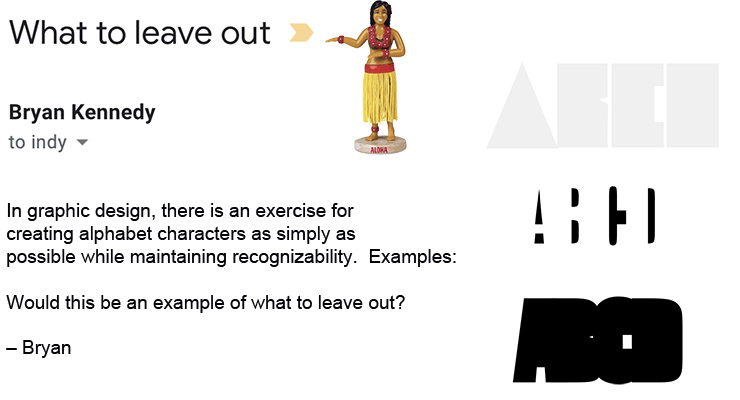Bryan,
Those are good examples of “leaving things out.”
They reminded me of something I ought to have included in last week’s Memo:
When you leave things out, you place your trust
in the perceptive ability of your audience.
Therefore, it is always a calculated risk,
because not everyone will be able to leap the gap.
EXAMPLE: Any person not familiar with our alphabet would not see ABCD in the examples you sent.
In Travels with Charley, John Steinbeck said, “As he sat in the seat beside me, his head was almost as high as mine. He put his nose close to my ear and said ‘Ftt.’ Charley is the only dog I ever knew that could pronounce the consonant F.”
Obviously, John Steinbeck never met Indy Beagle. Indy can say “frankfurter” so clearly that it rings like chimes. You know, the ones we’ve heard together at midnight.
SECOND EXAMPLE: In that last sentence, I am depending on the reader to be familiar with the phrase, “We have heard the chimes at midnight.” If they know that phrase, they will understand that I am identifying them as my longtime partner in mischief.
In Shakespeare’s Henry IV, Part 2, Sir John Falstaff affirms Justice Shallow’s reminiscing about their long-past school days by saying, “We have heard the chimes at midnight, Master Shallow.” To which Shallow replies, “That we have, that we have, that we have. In faith, Sir John, we have… Jesus, the days that we have seen.”
As long as we’re talking about Shakespeare, Jem Bloomfield says the line, “O Romeo, Romeo. Wherefore art thou Romeo?” (Romeo and Juliet, II.1) has long been misunderstood.
Rather than saying, “Where are you, Romeo?” Juliet is in fact saying “Why are you called Romeo?” She is beginning an intellectual wrangle with herself on the relationship between a name and the object it points to, which ends in another famous quotation: that “a rose/ By any other name would smell as sweet.”
Likewise, Frank Kermode suggested in Shakespeare’s Language that the use of “your” has been misunderstood in the line, “There are more things in heaven and earth, Horatio, than are dreamt of in your philosophy.” (Hamlet, I.5) Rather than “your” referring to Horatio, Kermode argues that its meaning may be closer to “the.” Hamlet is not criticizing Horatio’s limited world-view, but is saying that philosophy cannot contain the reality of our experience.
But we were talking about “leaving things out,” were we not?
My original plan for this page was to let you read my whimsical musings about why Indy Beagle would make a good president. I created a campaign poster and everything! But after a long and impassioned debate, Indy finally convinced me not to publish a link to that page.
“Boss,” he said, “In the same way that you count on readers and listeners to ‘fill in’ what you purposely left out, don’t you think it likely that they will also ‘fill in’ motives that you may not have had? What are the odds that your readers will understand that you were clowning around about how a dog might be the best qualified to unite our nation right now? Don’t you think they will assume that your message contained a veiled commentary of some sort?”
“Indy,” I said, “I should have listened to you more closely before I recorded the audio version of the memo. You’re a good friend.”
Maybe some day when the temperatures of our emotions are running less high, I’ll give you the link to my “Indy Beagle for President” campaign brochure. But for now, Indy has convinced me to “leave it out.”
If you’d like to jump from here to the first page of this week’s rabbit hole, just click this link. Or you can click the picture of Aloha at the top of this page.
Roy H. Williams
